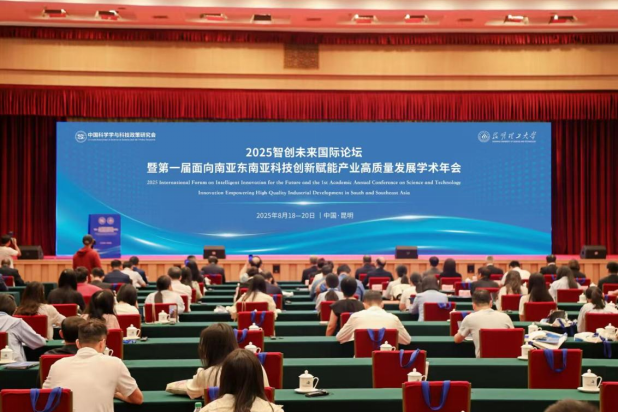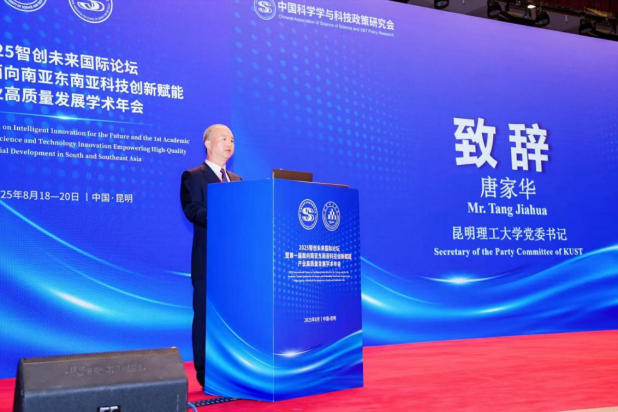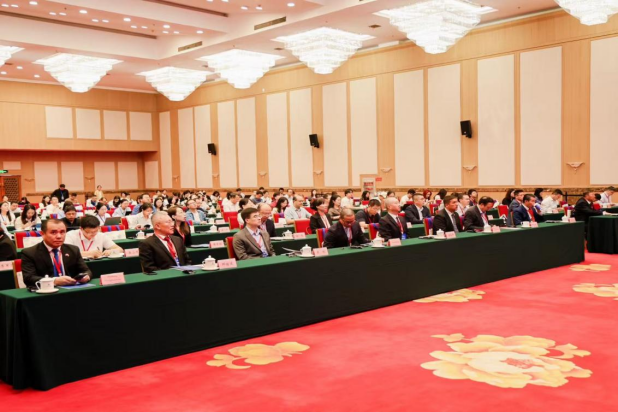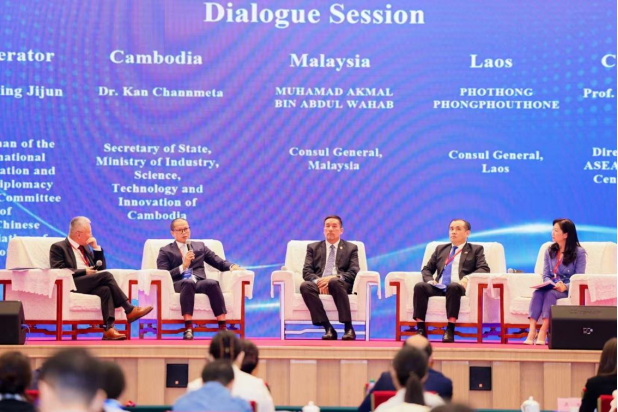From August 18 to 20, 2025, the "2025 International Forum on Intelligent Innovation for the Future and the First Academic Conference on Science and Technology Innovation Empowering High-Quality Industrial Development in South and Southeast Asia" was held in Kunming, Yunnan. The conference was hosted by Kunming University of Science and Technology and the Professional Committee of International Cooperation and Science & Technology Diplomacy of the Chinese Association of Science of Science and Science & Technology Policy, and was jointly organized by the Faculty of Management and Economics, the ASEAN Research Center, the China-ASEAN Industrial Innovation Collaborative Development Research Center, and the "Double First-Class" Initiative Office of KUST. The conference aimed to facilitate intellectual exchange through academic discussions, promote the transformation of technological demonstrations, accelerate the integration of digital-intelligent technologies with the region's advantage industries, attract high-quality resources, build a collaborative innovation ecosystem involving industry, academia, research, and application, and drive regional industries toward high-end and intelligent advancement.

Tang Jiahua, Chairman of the University Council of KUST, attended the opening ceremony and delivered a speech. He pointed out that the conference serves as a significant measure to thoroughly implement the guiding principles of the 20th National Congress of the Communist Party of China and the national 14th Five-Year Plan, which emphasize strengthening the core role of sci-tech innovation and promoting high-quality industrial development. It also represents an active effort to support the national Belt and Road Initiative and contribute to building a China-ASEAN community with a shared future. The conference closely aligns with the goal of establishing a regional radiation center. By pooling regional wisdom and exploring pathways for digital-intelligent technologies to empower industrial upgrading, it aims to contribute to the formation of a closer China-ASEAN innovation and cooperation network. He expressed gratitude to all supporting parties and looked forward to the conference playing a role in enhancing regional collaborative development and drawing a new blueprint for the future.

The conference centered on the theme of "Intelligent Innovation for the Future", focused on how technological innovation empowers high-quality industrial development, particularly in fields relevant to South and Southeast Asia. It featured six sub-forums and 56 specialized presentations covering hot topics such as science and technology diplomacy, AI regulation, industrial chain resilience, and corporate digital-intelligent transformation.
More than 300 experts, scholars, industry representatives, and diplomatic envoys from various Southeast Asian countries including China, Thailand, Laos, and Cambodia attended the event. Distinguished experts such as Dr. Kan Channmeta, Secretary of State at the Ministry of Industry, Science, Technology & Innovation of Cambodia, Prof. Phoupet Kyophilavong, Vice President of the National University of Laos, Prof. Nisit Panthamit, Director of the ASEAN Research Center at Chiang Mai University, Thailand, Dr. Zaw Oo, Executive Director of the Centre for Economic and Social Development (Myanmar), and AP Dr. Yu Kok Hwa, Quality & Enterprise Project Chair at the School of Mechanical Engineering, Universiti Sains Malaysia, engaged in in-depth discussions on intelligent innovation, China-Laos sci-tech collaboration, and cutting-edge developments in semiconductors.
On the domestic side, experts including Researcher Wu Gang, Deputy Director of the Department of Management Sciences at the National Natural Science Foundation of China, Researcher Mu Rongping, Chairman of the Chinese Association of Science of Science and S&T Policy, and Researcher Ma Minxiang, Vice President of the Yunnan Academy of Science and Technology, shared valuable insights on frontier issues such as AI-enabled technological innovation and international sci-tech cooperation.
Multiple specialists and scholars delivered presentations around themes including AI-empowered technological innovation and digital-driven transformation, with discussions concentrating on region-specific needs such as industrial and supply chain resilience and corporate digital-intelligent upgrading. These exchanges fully demonstrated the practical direction of digital-intelligent technologies in promoting industrial upgrading in South and Southeast Asia, and in serving the national peripheral diplomacy strategy and regional coordinated development initiatives.

It is noteworthy that the conference addressed region-specific development needs through dedicated sessions on artificial intelligence enabling high-quality industrial development and next-generation AI-driven management innovation, highlighting the growing trend of digital and intelligent technologies facilitating industrial upgrading in South and Southeast Asia. It also featured cutting-edge themes such as science and technology diplomacy, global governance, and intellectual property protection, facilitating the exchange and demonstration of practical achievements in transnational cooperation and regional collaborative development through technological innovation. Participants actively shared academic insights and practical experiences, further fostering deeper integration between technological innovation and high-quality industrial development oriented toward South and Southeast Asia.

The conference serves as a concrete action implementing the national innovation-driven development strategy, the requirements for high-quality development of the Belt and Road Initiative, and the spirit of the Joint Declaration on the China-ASEAN Strategic Partnership for Peace and Prosperity. The conference not only facilitated collaboration between academia and industry in South and Southeast Asia and deepened regional innovation cooperation—providing support for cross-border technology transfer and industrial upgrading—but also explored an effective pathway under the national macro-policy framework to empower industrial upgrading and promote common development in the region through technological innovation. It holds significant meaning in serving the nation’s high-level opening-up and the broader context of regional coordinated development.
Kunming University of Science and Technology has long been committed to supporting the construction of a radiation center aimed at South and Southeast Asia. Through joint cultivation of high-level technical talent with the National University of Laos, the university has become a core force in the China-Laos Railway photovoltaic energy supplementation project. Joint laboratories established with universities in Thailand and Vietnam have tackled key technical challenges such as “efficient extraction of low-grade copper ore,” boosting related industrial output in Southeast Asia by over CNY 3 billion. Furthermore, the high-temperature adaptable energy storage materials developed by the university have been successfully applied in Thailand’s subway systems and Myanmar’s photovoltaic power stations, saving more than USD 120 million in energy costs. Moving forward, Kunming University of Science and Technology will continue to deepen its “talent cultivation—scientific cooperation—cross-border education” model to contribute to high-quality regional development.
Translated by: MA Bingyu, Division of International Cooperation
Source: Faculty of Management and Economics
Issued by: Division of International Cooperation